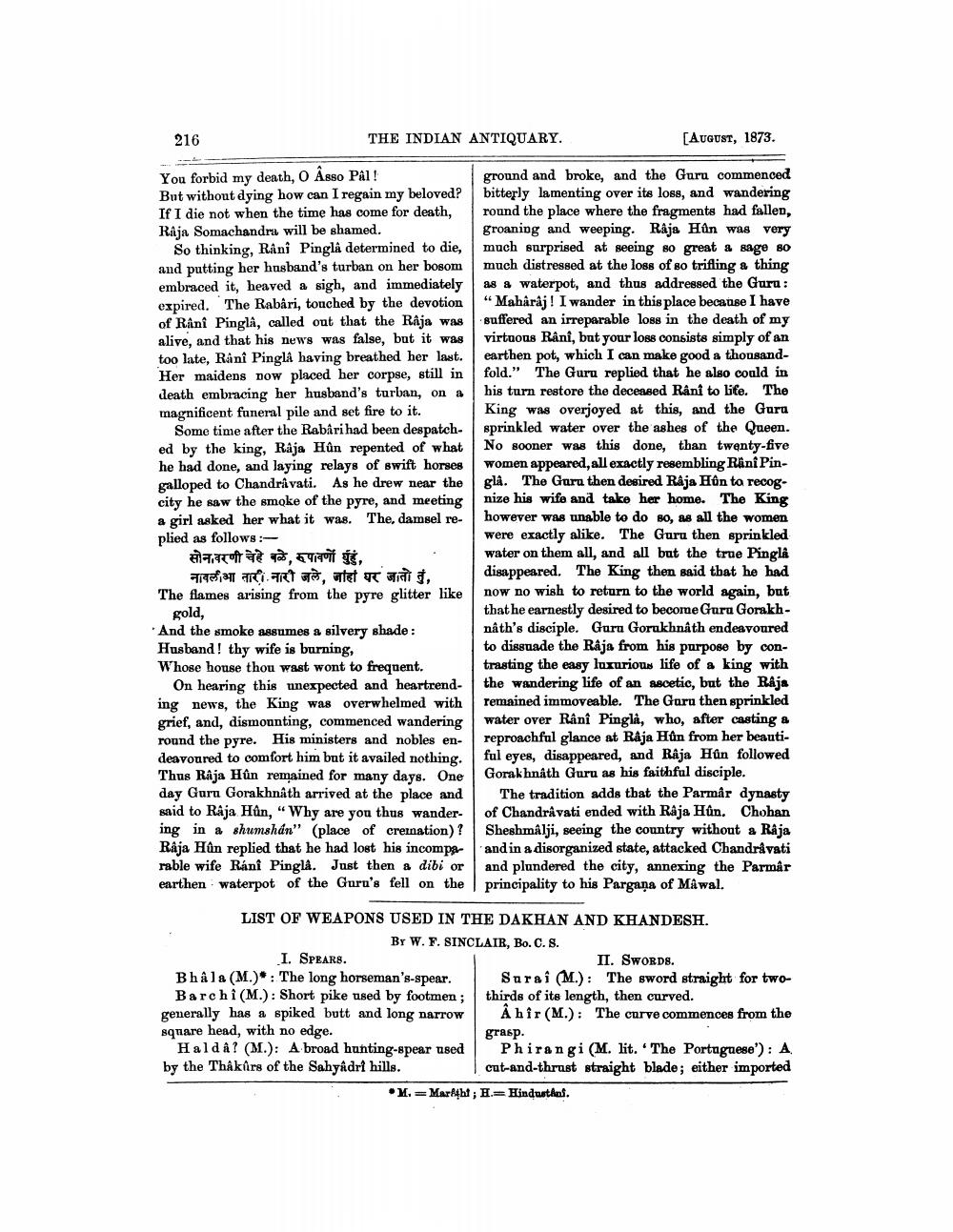________________
216
THE INDIAN ANTIQUARY.
[AUGUST, 1873.
You forbid my death, 0 A880 PAI! But without dying how can I regain my beloved? If I dio not when the time has come for death, Raja Somachandra will be shamed.
So thinking, Rani Pingla determined to die, and putting her husband's turban on her bosom embraced it, heaved a sigh, and immediately expired. The Rabari, touched by the devotion of Rani Pinglâ, called out that the Raja was alive, and that his news was false, but it was too late, Rani Pinglå having breathed her last. Her maidens now placed her corpse, still in death embracing her husband's turban, ona magnificent funeral pile and set fire to it.
Some time after the Rabari had been despatched by the king, Raja Hûn repented of what he had done, and laying relays of swift horses galloped to Chandravati. As he drew near the city he saw the smoke of the pyre, and meeting a girl asked her what it was. The, damsel replied as follows:
सोनावरणी चेहे बळे,रुपावों घुहुँ,
नावली तारीनारी जले, जाहाँ पर जातो हुँ, The flames arising from the pyre glitter like
gold, And the smoke assumes a silvery shade: Husband! thy wife is burning, Whose house thou wast wont to frequent.
On hearing this unexpected and heartrending news, the King was overwhelmed with grief, and, dismounting, commenced wandering round the pyre. His ministers and nobles endeavoured to comfort him but it availed nothing. Thus Raja Hûn remained for many days. One day Guru Gorakhnath arrived at the place and said to Raja Hûn, “Why are you thus wandering in a shumshán" (place of crenation)? Raja Hûn replied that he had lost his incompa rable wife Ráni Pingla. Just then & dibi or earthen waterpot of the Guru's fell on the
ground and broke, and the Guru commenced bitterly lamenting over its loss, and wandering round the place where the fragments had fallen, groaning and weeping. Raja Hûn was very much surprised at seeing so great a sage so much distressed at the loss of so trifling a thing as & waterpot, and thus addressed the Guru: “Maharaj ! I wander in this place because I have suffered an irreparable loss in the death of my virtoons Rânî, but your loss consists simply of an earthen pot, which I can make good a thousandfold." The Guru replied that he also could in his turn restore the deceased Rani to life. The King was overjoyed at this, and the Guru sprinkled water over the ashes of the Queen. No sooner was this done, than twenty-five women appeared, all exactly resembling Rani Pingla. The Guru then desired Raja Hôn to recognize his wife and take her home. The King however was unable to do so, as all the women were exactly alike. The Guru then sprinkled water on them all, and all but the true Pinglå disappeared. The King then said that he had now no wish to return to the world again, but that he earnestly desired to become Guru Gorakhnâ th's disciple. Guru Gorakhnath endeavoured to dissuade the Raja from his purpose by contrasting the easy luxurious life of a king with the wandering life of an ascetic, but the Raja remained immoveable. The Guru then sprinkled water over Rani Pingla, who, after casting & reproachful glance at Raja Hån from her beautiful eyes, disappeared, and Raja Hûn followed Gorakhnath Guru as his faithful disciple.
The tradition adds that the Parmar dynasty of Chandrâvati ended with Raja Hûn. Chohan Sheshmâlji, seeing the country without a Raja and in a disorganized state, attacked Chandravati and plundered the city, annexing the Parmar principality to his Pargana of Mawal.
LIST OF WEAPONS USED IN THE DAKHAN AND KHANDESH.
BY W. F. SINCLAIR, Bo. C. S. I. SPEARS.
II. SWORDS. Bhåla (M.): The long horseman's-spear. Sarai (M.): The sword straight for two
Barchi(M.): Short pike used by footmen; thirds of its length, then curved. generally has a spiked butt and long narrow Ahir (M.): The curve commences from the eqnare head, with no edge.
grasp. HaldA? (M.): A broad hunting-spear used Phirangi (M. lit. The Portuguese') : A by the Thákars of the Sahyadri hills.
cut-and-thrust straight blade; either imported . .=Marlight; H.= Hindustan




